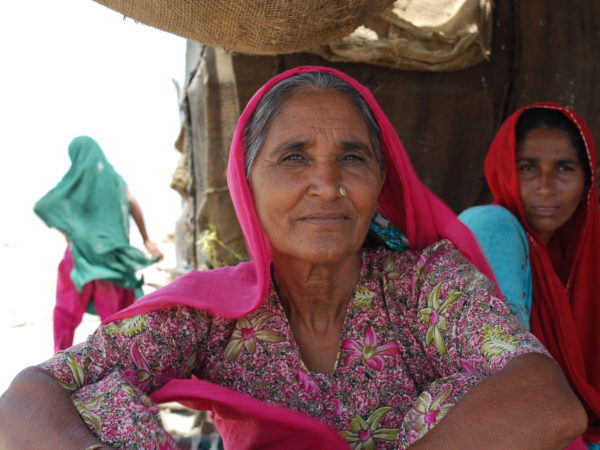Rights of Women, Children, and Marginalized Groups
Women, children, and other marginalized groups are often the least likely to be consulted about a project that will impact their livelihoods, yet bear the brunt of impacts such as denial of access to water, food security threats, and physical and sexual abuse. Our approach identifies and addresses forms of marginalization and hierarchy that are specific to each community where we work. We employ respect-based methods to ensure that women, children and other marginalized people are included as full participants in community strategies seeking accountability so that those with the power to stop abuses and make change respect their rights and needs.
When communities in Liberia harmed by a biomass project asked Accountability Counsel to support them through a complaint to the U.S. agency that funded the project, we applied our respect-based approach. Because of our efforts to reach out to women, children, and other marginalized groups, our clients shared for the first time that there had been widespread sexual abuse by company employees, gender-based workplace discrimination, and increased danger to women in childbirth and additional burdens for women and girls tasked with traveling far distances to fetch water due to water contamination caused by the project. Through our work, we documented these impacts in an official complaint, video, and in the media, while protecting and advancing the rights of the women who came forward. Our advocacy resulted in a full investigation verifying abuses and prompted changes to U.S. federal law to ensure that these types of abuses are prevented in the future.
Relevant Cases Include: Ridge to Reef Conservation Project, Myanmar | Oil in the Amazon, Peru | Oro Province Palm Oil, PNG | Biomass Project in Buchanan, Liberia| Hydroelectric Power in Oaxaca, Mexico | Caracol Industrial Park, Haiti | Airport Expansion Project, Colombia
Select Media
Myanmar: Ridge to Reef Project
- 20 August 2019 – Indigenous Communities in Myanmar Take Action Against Top-Down Conservation By Anirudha Nagar, Accountability Counsel, in The Diplomat
- 9 August 2019 – UN Team Meets Locals to Discuss Issues with Tanintharyi Conservation Project By Kyaw Soe Htet, Myanmar Times
Peru: Oil in the Amazon
- 15 April 2015 – Gold Rush: How the World Bank is Financing Environmental Destruction By Ben Hallman and Roxana Olivera, HuffPost & International Consortium of Investigative Journalists
Liberia: Biomass Project in Buchanan
- 26 March 2019 – What happens when a DFI project goes wrong? By Teresa Welsh, Devex
- 17 July 2018 – It Takes Consultation to Help a Village By Rachel Cernansky, New York Times
- 3 March 2017 – AC and Partners Successfully Press OPIC to Strengthen Its Environmental and Social Policy Statement
- 8 December 2016 – New FOIA Release Shows U.S. Agency Ignored Warnings While Investing Millions in Failed Project in Liberia By Kindra Mohr & Lani Inverarity, Accountability Counsel, in HuffPost
Mexico: Oaxaca Hydroelectric
- 5 June 2019 – A Conversation with Gabino Vicente: Preventing Environmental Harm in International Development
- 26 March 2019 – What happens when a DFI project goes wrong? By Teresa Welsh, Devex
- 9 April 2018 – Community watches over creek’s turtles By Mexico News Daily
- 31 January 2018 – The Human Rights Ripple Effect By New Media Advocacy Project
Haiti: Caracol Industrial Park
- 14 January 2020 – Haiti farmers eager to receive compensation after ‘groundbreaking’ land deal By Jacob Kushner, Thomson Reuters Foundation
- 9 January 2020 – When HOPE is POWER: Haitian Farmers Defend Land Rights in Historic Dialogue Process By Lani Inverarity, Accountability Counsel
- 29 March 2019 – AAAS connects human rights groups with science experts By Andrea Korte, Science Magazine
- 29 January 2019 – Displaced farmers’ coalition reclaims their road to sustainable livelihoods 9 years after Haiti’s devastating earthquake By Janine Mendes-Franco, Global Voices
- 14 January 2019 – Haiti Farmers Demanded Justice After Losing Their Land – Their Victory Shows What Empowering Workers Can Achieve By Lani Inverarity, Accountability Counsel, in Business & Human Rights Resource Centre
Colombia: Airport Expansion Project
- 5 October 2018 – In their own voice: why access to information matters to communities
- 19 December 2017 – Open Letter to Salvador Alejandro Menéndez García, Mayor of San Luis Talpa, El Salvador
- 29 September 2017 – Deafening noise from flights over Fontibón in Bogotá, Colombia. Something went wrong with the IDB By Lani Inverarity, Accountability Counsel, in openDemocracy
-
 Use of child labor in harvesting palm oil in Papua New Guinea (photo credits: CELCOR)
Use of child labor in harvesting palm oil in Papua New Guinea (photo credits: CELCOR) -
 Women and children were particularly impacted by water pollution associated with the biomass project in Liberia
Women and children were particularly impacted by water pollution associated with the biomass project in Liberia -
 Eva Baptiste, member of the Komite, whose family lost land to make way for the Caracol Industrial Park
Eva Baptiste, member of the Komite, whose family lost land to make way for the Caracol Industrial Park -
 Shipibo Indigenous women and children who are affected by Maple's oil operations in the Peruvian Amazon
Shipibo Indigenous women and children who are affected by Maple's oil operations in the Peruvian Amazon -
 Communities affected by Ridge to Reef are taking action to ensure that conservation efforts respect their rights
Communities affected by Ridge to Reef are taking action to ensure that conservation efforts respect their rights -
 A Colombian child living in the worst affected zone of the airport expansion project suffers hearing loss
A Colombian child living in the worst affected zone of the airport expansion project suffers hearing loss

